When you’re planning a wedding there are lots of decisions to make. But among the most difficult are the ones relating to your guest list: who to invite and who to leave off the list?
Weddings are expensive and it’s simply not feasible to put on a party for 500. Equally, many couples prefer smaller, more intimate affairs and opt for venues that only cater to limited numbers.
So who makes the list, and who is culled – and what might the consequences be?
If you don’t include the friend that you recently reconnected with, will they speak to you again? If you belong to a coffee group, should you invite the entire group?
If you invite one aunt, are you obliged to ask them all?
What if your friend expects to bring her new boyfriend – but you’ve never met him and would rather that place went to another friend?
If you’re close to a couple who have recently separated, can you still invite them both?
The drawing up of the guest list is like tiptoeing through a mine field. Put one foot wrong and you’ll lose a limb (or friend).
Christchurch wedding planner Emma Newman confirms what we suspected – that the guest list and budget are the top causes of stress for her clients. In fact, she had literally just got off the phone from a bride stressing about her guest list when we rang her for this story.
“I think it’s because of the ritual and celebration that surrounds a wedding,” she says.
“A wedding is not only a declaration of your love for your partner, it’s a declaration of how much you regard those you’ve invited. You’re saying to the world, ‘we love these people the most’.”
But it doesn’t mean you don’t like the people you didn’t invite, and so as much as it’s your big day and you can invite who you like, remember to be sensitive and empathetic to those who didn’t make the cut. Explain you were forced to restrict numbers if they ask. And if they don’t ask but you can sense they are hurt, you could broach the subject with them. How you communicate with those you do and don’t invite can make all the difference.
When it comes to putting together your list there are a few basic guidelines you can fall back on to help you make decisions, however Newman believes it’s better to go on a case-by-case basis.
“The question I ask my brides is, ‘Do you see yourself wanting this person at your first child’s christening or, as awful as this sounds, at your parent’s funeral?’
“If the answer is yes, then absolutely, they should be at your wedding. If not, then you shouldn’t feel any obligation.”
With that said, here are our top tips for putting together your wedding guest list:

When was the last time you caught up in person?
Many of us are in regular contact with friends and acquaintances through social media channels like Facebook or Instagram, but we rarely – if ever – bother to see them in person. Why? Because they’re probably not part of our inner circle – the friends we’d ring in a crisis, drop anything for, or make the effort to see if we were in their neck of the woods.
Newman believes social media has really blurred the lines on friendship.
“Facebook, for example, connects us with more and more people, and we can think we’re quite close to one another because of the way we communicate online. But it’s a perceived sense of closeness.”
Nothing beats spending time with friends in person.
Who you invite to your wedding comes down to who you make the effort to spend time with.
Old friends don’t necessarily trump new friends
There are some friends in life who you always feel connected to, no matter how many years have passed. Whenever you see one another, you pick up right where you left off. Time, circumstances and geography have no bearing on your bond. These friends are forever friends and should definitely be at your wedding.
But new friends are special too. Don’t write someone off just because you’ve only known them six months. If your connection is strong, that’s every reason to invite them.
And what about an old friend that you’ve recently reconnected with? Obviously there was a period of time where you weren’t picking up where you left off with one another and it can take time and effort to build that trust and rapport again. If the relationship still feels shaky, don’t invite them.
Go by how you feel after you’ve spent time with a friend (old or new). If it’s energised, happy and warm, then they’re a friend you should have at your wedding. If you feel drained, resentful or annoyed in some way, that tells you everything you need to know.
Story continues, below:

Keeping the aunties happy
This one depends on a couple of things – how good you are at communicating with your family, and who’s paying for the wedding.
“Couples have no obligation to invite all of the aunties if they’re not close to them – and this applies to cousins and other extended family too,” says Newman.
“But if you decide to only invite one auntie, be upfront and clear as to why. Explain to the family, or have your parents explain: ‘It’s because Sarah has an amazing relationship with Aunt Trudy.’ Enough said.”
BUT, if you’ve allowed your family to help pay for the wedding, then you need to accept that they will expect to have some say in who gets invited.
“If you don’t want to negotiate on the guest list, don’t accept money,” Newman says bluntly.
When friends have separated
As uncomfortable as a separated couple may feel having to be around one another on your big day, it comes down to exactly that – this is YOUR big day.
They need to put their big girl or big boy pants on, and turn up and smile and be happy for you.
You love them both!
Can you split a group?
If you’re having a big wedding, the more the merrier, right? But if you’re limited on how many places you can offer, you might have to split a group.
Again, it comes down to following your heart.
If you belong to a coffee group of eight mothers, for example, but only feel close to two of them, it’s perfectly fine to invite only those two.
If you work in a small team environment, the same applies.
Says Newman, “People understand how much a wedding can cost these days, and that you’re very lucky if you get invited. That naivity of old, where everyone expected an invitation, I think that’s behind us now.”
Some brides have addressed the group dilemma in the past by inviting the entire group to the reception but not the ceremony. But many feel uncomfortable with this approach because it can give your friends the impression that you regard them as ‘second tier’ or ‘B grade’ friends. Ouch.

What about your friend’s new boyfriend?
If you adore your friend and know her new boyfriend makes her deliriously happy and you can’t wait to meet him, sure – why not?
But if you would rather the place go to another good friend, don’t feel guilty about saying no to the new boyfriend.
The fact that weddings are costly affairs, and that many couples don’t fall back on family to pay for their nuptials any more, has meant that the ‘plus one’ concept is no longer ‘a thing’.
Many wedding guests attend weddings alone and they’re fine with it.
And lastly, what NOT to do if you don’t make the guest list
Vow to never speak to the bride and groom again.
Contact the bride’s parents and suggest to them that you come anyway to surprise the bride before she walks down the aisle. This actually happened and the bride’s parents were horrified. They told her it wasn’t a good idea.
Assume your invitation got lost in the mail.
Demand to know why you weren’t invited.
The bride and groom had their reasons for not inviting you and it doesn’t mean they don’t like you or never want to see you again. They simply couldn’t invite everyone and had to draw the line somewhere. Respect their decision and move on.




